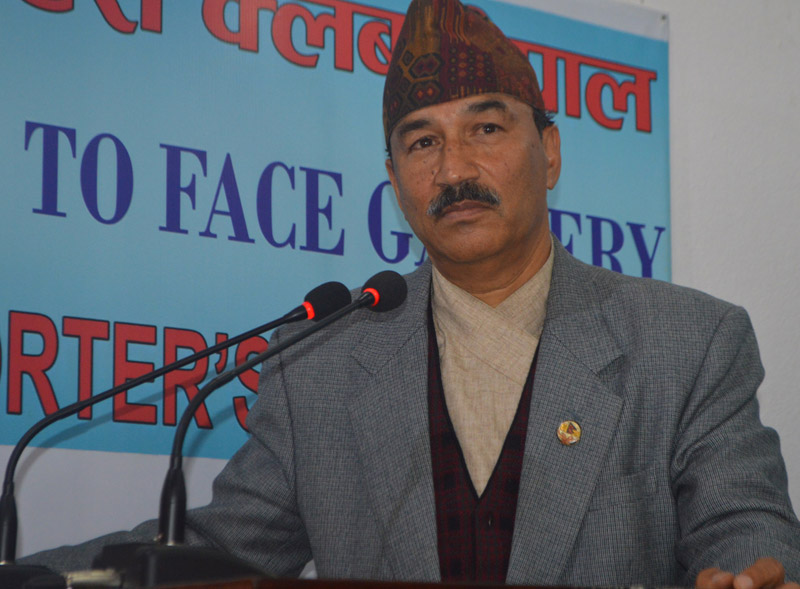Thriving black market pollutes country’s fragile economy
Kathmandu, January 6
Deputy Prime Minister and Foreign Affairs Minister Kamal Thapa made an utterly appalling statement yesterday.
During an interaction held by Nepal Chamber of Commerce, he said people engaged in black-marketing were supporting the government, which was facing difficulties in normalising the supply situation due to disruptions at Nepal-India border points.
The statement made by the person, who should be maintaining law and order, has made one wonder whether the government is supportive of criminal rings operating in the country.
If that is the case, it corroborates rumours that the government is turning a blind eye to the thriving underground market for fear that crippling shortage of goods in formal as well as shadow markets could create commotions and force it to step down.
Since the blockade was imposed on Nepal-India border points in the fourth week of September, the network of smugglers of various goods, especially petroleum products, has expanded rapidly.
These days, these smugglers work so openly, they can be found on the streets of Kathmandu selling petrol packaged in throwaway plastic water containers for Rs 250 to Rs 300 per litre — approximately 2.5 to three times retail market price. Many grocery stores are also engaged in this illegal trade.
These things happen in broad daylight, yet law enforcement agencies do not care.
The government may be assuming that what people care about is the ‘end’ and not ‘means to an end’.
But this theory is flawed, as it could encourage the greedy, who are making millions of rupees per day, to find out ways to give continuity to the informal trade. This could gradually institutionalise black-marketing, which could have serious repercussions on the economy.
But the government is — as it has always been — short-sighted and considers shadow economic activities as temporary phenomena, which can be weeded out once normalcy is restored.
“What is happening now can be compared to wild mushrooms growing during the monsoon. Once the rainy season is over, these mushrooms won’t live for long,” Finance Minister Bishnu Prasad Paudel told a press meet organised in the Ministry of Finance today.
If the finance minister’s prediction turns out to be true, fine; it will not hurt the economy and the country.
But what if complications arise even after supply disruptions come to an end? The possibility of such a thing coming true cannot be ruled out as the smugglers, who are getting richer, are also getting bolder.
Just today, suspected Indian smugglers clashed with Madhesi protesters at Nepal-India border point near Birgunj,
after they were barred from supplying various goods across the border. This group also hurled petrol bombs at protesters, while police virtually did nothing.
Groups like these want the blockade at Birgunj border point to prolong so that they could continue making quick bucks. But the benefit that is going to a small group is coming at the cost of sufferings of a big mass of people — especially those belonging to lower and lower-middle income groups, who are compelled to pay three to four times the retail price to purchase cooking gas and oil, petrol and other essentials.
The surge in their expenses has made them feel poor, which is creating disgruntlement. If effective measures are not taken on time, this group of people will revolt or follow the path of their friends, who are doing menial jobs abroad, further intensifying labour flight from a country which is already facing shortage of workers.
So, there is no alternative to curbing shadow economic activities because they can have serious consequences on formal-sector businesses, policy-making and the formal economy.
Already, industrialists are wondering how to file tax returns, as many of them are buying fuel in the black market at inflated prices.
Since the underground market does not produce invoices, these industrialists are concerned whether fuel expenses that their companies have made will be approved by auditors and the taxman.
Also, a prospering shadow economy makes official statistics on unemployment, official labour force, income and consumption unreliable, says a report prepared by the International Monetary Fund (IMF). And policies and programmes designed on the basis of ‘unreliable statistics may be inappropriate and self-defeating’.
Worse, the growth of the shadow economy can set off a destructive cycle because transactions in the informal economy escape taxation, hitting the government’s revenue collection.
“If the tax base or tax compliance is eroded, governments may respond by raising tax rates. Higher taxation — especially when combined with a perceived deterioration in the quality of public goods and public administration, or under investment in public infrastructure — motivates firms and workers even more strongly to move into the shadow economy, perpetuating the cycle. This worsens the budget constraints on the public sector,” says the IMF report.






